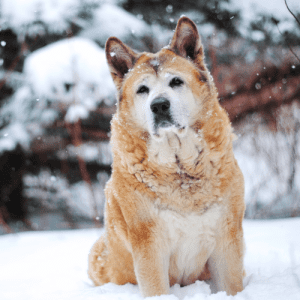
What Is The History Of The Korean Jindo: Jindo Breed?
The Korean Jindo, a breed steeped in history and legend, hails from the Jindo Island in South Korea. Believed to have been bred for centuries, these dogs developed in isolation on the island, resulting in a distinct and resilient breed. They were originally utilized for various tasks such as hunting, guarding, and protecting homes and livestock. The Jindo’s legendary loyalty and survival instincts were put to the test during the Korean War, when they exhibited remarkable abilities to find their way back home, even through great distances. This breed’s enduring legacy and unwavering devotion make it a cherished national treasure in South Korea and a beloved companion worldwide.
What Does A Korean Jindo: Jindo Look Like?
The Korean Jindo is a striking and medium-sized breed known for its elegance and strength. They have a well-proportioned body with a double coat that comes in a variety of colors including red, white, black, tan, and brindle. Their almond-shaped eyes radiate intelligence and alertness, reflecting their keen senses. The Jindo’s erect ears and bushy tail add to their distinctive appearance. Their physical features are a testament to their adaptability to the harsh climate and rugged terrain of Jindo Island, where they originated.
How Big Is An Adult Korean Jindo: Jindo?
Korean Jindos are medium-sized dogs, typically standing between 18 to 21 inches (45 to 53 cm) at the shoulder. In terms of weight, they usually range from 35 to 50 pounds (16 to 23 kg). Their compact yet muscular build showcases their agility and stamina, which were essential traits for their traditional roles as hunters and protectors.
Are There Other Dog Breeds Related To The Korean Jindo: Jindo?
- Shiba Inu: These Japanese dogs share some similarities with Jindos in terms of appearance and strong-willed nature.
- Akita Inu: Like the Jindo, Akitas have a deep history and are known for their loyalty and protective instincts.
- Basenji: This breed’s independence and unique vocalizations are reminiscent of the Korean Jindo’s self-reliant nature.
- Thai Ridgeback: Similar to Jindos, these dogs are known for the distinctive ridge of hair along their back and their loyalty to their families.
- Hokkaido Dog: Another Japanese breed with an ancient history, these dogs have a strong sense of loyalty and courage.
What Is The Life Expectancy Of A Korean Jindo: Jindo?
Korean Jindo dogs typically have a lifespan of around 12 to 16 years when provided with proper care, nutrition, exercise, and regular veterinary check-ups. Their robust nature and historical resilience contribute to their potential for a long and healthy life.
Can A Korean Jindo: Jindo Be Trained?
Yes, Korean Jindo dogs are intelligent and capable of being trained, but their independent and strong-willed nature requires a patient and consistent approach. Early socialization and positive reinforcement training methods are key to their success. These dogs have a natural inclination to form strong bonds with their owners, which can be leveraged to create a cooperative training environment.
What Are Some Interesting Facts About A Korean Jindo: Jindo?
- Homecoming Instinct: Korean Jindos are known for their incredible homing abilities, with numerous stories of their determination to return to their families even over great distances.
- One-Person Dogs: Jindos often form a deep bond with a single person, showcasing their loyalty and devotion.
- Aloof Nature: While affectionate with their family, Jindos can be reserved or aloof around strangers, which is a reflection of their independent nature.
- Unique Vocalizations: Jindos are known for their unique range of vocalizations, which include barks, howls, and “screams,” often used to communicate with their owners.
- Strong Hunting Instincts: These dogs have a natural prey drive, stemming from their history as skilled hunters on Jindo Island.
- Cultural Heritage: In South Korea, the Korean Jindo is considered a national treasure and symbolizes loyalty and resilience.
- Moderate Grooming Needs: Their double coat requires regular brushing to maintain its health and appearance, and they typically shed seasonally.
- Protective Guardians: Korean Jindos have a strong protective instinct, making them loyal and vigilant family protectors.
- Versatile Abilities: While historically known for their hunting and guarding roles, Jindos also excel in modern activities such as obedience, agility, and even therapy work.
- Diverse Coat Colors: Korean Jindos come in a variety of coat colors, including various shades of red, white, black, tan, and brindle.
How Does A Korean Jindo: Jindo Interact With People?
Korean Jindo dogs are known for their loyalty and strong attachment to their families. While they can be reserved or aloof around strangers, their deep bond with their human companions is undeniable. They are often one-person dogs, forming a particularly strong connection with a single family member. Their protective nature makes them devoted guardians, ready to defend their loved ones if they sense any threat. Despite their independent streak, Korean Jindos are affectionate and attentive with their families, providing unwavering companionship and loyalty.
